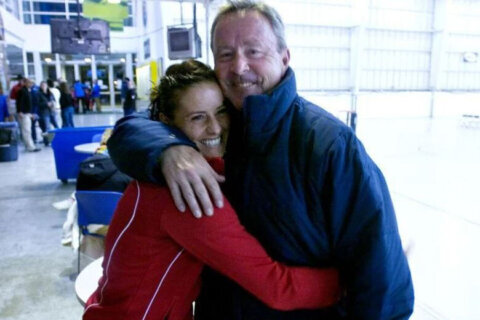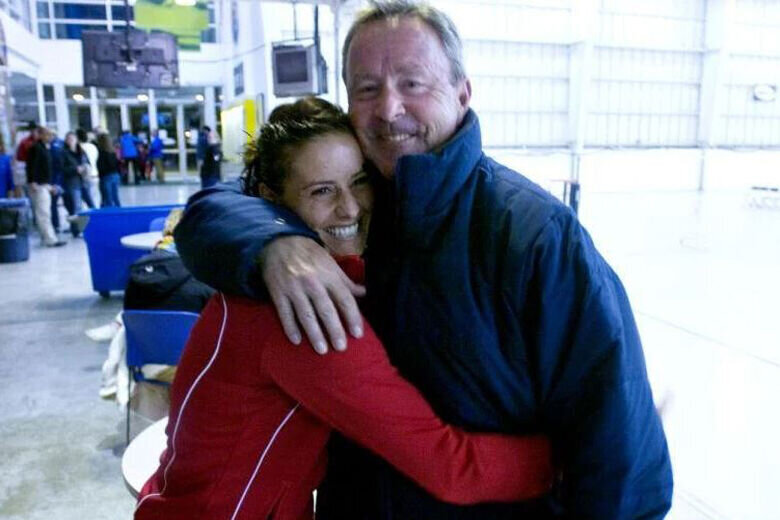This article was republished with permission from WTOP’s news partner InsideNoVa.com. Sign up for InsideNoVa.com’s free email subscription today.

As a young boy, Tommy Adams attended Osbourn Park High School’s boys soccer games coached by Ken Krieger. He did so not as a fan, but as a forward-in-training.
Adams wanted to learn the position’s intricacies when his turn came to play for Krieger in high school. To do that, Adams focused on Skip Skipwith, the Yellow Jackets’ scoring threat upfront. Tall, lean and fast, the all-state selection blazed past opponents his senior season to score an area-high 24 goals and help Osbourn Park reach the 1990 Group AAA state final.
Modeling his game after Skipwith, Adams believed he knew what Krieger wanted when the two teamed up at Hylton. He didn’t. The real education awaited him.
Like anyone who played for Krieger, it was never enough to have talent even though many of them did in droves.
He wanted you to understand the game within the game so that you were always one step ahead of your foe. And no boys soccer coach in the history of Prince William County athletics did a better job of teaching that to his players.
Krieger died March 4 at the age of 69 following a long battle with dementia. His celebration of life service is May 5 at 11 a.m. at the Howison Homestead Soccer Complex.
Krieger viewed soccer as something to play with poise and elegance. No kick and chase for his teams.
His teams ran at quick and efficient pace through spacing and proper runs. The one-touch style was methodical and disciplined with the right blend of deception and speed.
In general, high school teams in Northern Virginia did not play that way when Krieger coached. So he took it upon himself to show his players how to raise their game and play at a level that created something to marvel at and emulate.
Drawing on European teams as inspiration as well as his time serving as an assistant at American and George Mason universities under hall of fame coaches Pete Mehlert and Gordon Bradley, Krieger demanded that his players maximize the entire field.
It all started with proper positioning. Work the ball from the back with patience and vision and then in a flash, exploit multiple angles and attack the goal with proficiency.
In Adams’ case, Krieger communicated his desire with the help of basketball. Krieger wanted Adams to view the field like a point guard would on the court. When he received the ball, Adams surveyed his options. Go left. Go right. Go straight up the middle.
An excellent guard for Hylton’s basketball team, the 6-foot-3 Adams saw the soccer field in a new way. As a senior, he recorded an area-high 28 goals and earned all-state honors as the Bulldogs’ won their fourth and final state title under Krieger in 1998.
Although he had opportunities to play soccer at UVA or William & Mary, Adams instead signed with Hampton University for basketball. Feeling like he still had room to grow and that basketball would take him further, Adams enjoyed a stellar career at the MEAC school.
He won conference player of the year honors and helped lead the Pirates to two NCAA Tournaments, including an upset victory in 2001 when the 15th seeded Pirates beat second-seeded Iowa State in the first round.
Adams then went to preseason camp with three NBA teams (the Boston Celtics, New York Knicks and Milwaukee Bucks) before embarking on a seven-year pro career overseas.
But for all his hoops’ success, Adams never forgot what he learned under Krieger. It was more than just soccer. It was about trust. It was about humility. Most of all, it was about being open to new possibilities.
“His biggest impact on me is that he took a raw athlete and taught him a totally different style of soccer,” Adams said.
An impressive legacy
Krieger was a no-nonsense coach. With his deep voice and staccato way of speaking, Krieger got to the point and quickly. He did not mince words.
What he did do was connect the dots in a way that any good teacher does no matter the subject or the sport. They take the disparate and turn it into a cohesive narrative for any student to understand.
Yes, he had plenty of talent to work with. The list includes Hylton graduate David Stokes, the No. 5 overall pick in the 2003 MLS Draft, Forest Park graduate CJ Sapong, the 10th overall pick in the 2011 MLS Draft, and Hylton graduates Grover Gibson and Kyle Rakow, who were both Parade All-Americans.
But it’s one thing to have great players. It’s another to know how to maximize those abilities to full effect and on a consistent basis. Krieger managed the high expectations and personality challenges with ease.
“He was the Phil Jackson of soccer,” Adams said in reference to the head coach who won NBA titles with the Michael Jordan-led Chicago Bulls and Kobe Bryant/Shaquille O’Neal-led Los Angeles Lakers. “All the egos [Ken] had to deal with. He had his own ego. But he took all those egos and made something special.”
In 30 seasons at three different high schools (Osbourn Park, Hylton and Forest Park), Krieger went 386-184-37. His win total ranks fourth all-time among boys soccer coaches in Virginia. He was the first boys soccer coach in Virginia history to lead three different programs to the state tournament.
Overall, Krieger’s three teams reached 11 state tournaments while winning nine region titles and 14 district titles.
Krieger began his coaching career at Osbourn Park before starting the programs at Hylton and Forest Park when those two schools opened.
It was during his nine seasons at Hylton, though, where Krieger enjoyed his most success. From 1992-2000, the Bulldogs won four Group AAA state titles (1993, ’94, ’98 and ’99) and two national championships (1993, 1998). He was the NSCAA/Adidas Division I High School Coach of the Year in 1999.
“I learned life lessons being a player from Coach Krieger,” Stokes said. “He could distill complex scenarios into understandable and executable processes. For example, all of his players knew the importance of ‘Attention to detail’ and when to ‘Keep it simple.’ The vision and pathways he was able to create through his coaching yielded the only reasonable outcome: success.”
To this day, Stokes can hear Krieger’s counsel in his head when he plays recreational soccer.
“I still recall the defending principle, ‘See the man and the ball,’” Stokes said. “He taught his players how to be an effective individual within an effective team. I think, most of all, his impact is that he was such a positive influence on the lives of so many youths, including me, and gave us a sense of purpose and direction through soccer and life in general.”
Brian Albrecht agrees. Albrecht played for Krieger at Osbourn Park before going on to star at James Madison University.
“He was constantly trying to learn new tactics and details to pass on to his players and teams to improve them,” Albrecht said. “His love for the game was contagious as a player because he was teaching new skills, ideas and tactics that improved us all. That is the mark he made on soccer and being the legend he is now.”
Coaches learned so much from Krieger as well.
Larry Nemerow replaced Krieger as Osbourn Park’s head soccer coach when Hylton hired Krieger to start its program when the Woodbridge school opened in 1991.
Nemerow watched Krieger coach in person any chance he could, even if it meant going to a Hylton game instead of scouting an upcoming opponent. To absorb any nuggets he could, Nemerow positioned himself in a certain place near Hylton’s bench to hear what Krieger told his players.
Nemerow had a successful coaching career at OP, winning 299 games in 23 seasons. But he always struggled to beat Hylton when Krieger coached there.
“He was probably in my 40 years of coaching, figuratively speaking, the mountain with the highest peak and I was always climbing to get to the top and compete with him,” Nemerow said.
Staying in touch
Krieger made it a point to keep tabs on his former players.
Albrecht recalled Krieger attending one of his college games when JMU played at William & Mary in Williamsburg. Albrecht did not know Krieger was there until the game ended.
When the two caught up afterward, Albrecht told his former coach he hoped he’d lived up to the Krieger standard level of play. Krieger did not say anything. He smiled and in typical fashion, chuckled under his breath, while nodding his head.
“Ken was very influential in my life because he held myself, peers, and teammates accountable to each other, the school, him and ourselves,” Albrecht said. “In high school, there are a lot of decisions to make at a young age and Ken always reminded us that he was watching us wherever we were at. That mentality and leadership continued when we laced up our cleats and played the game Ken loved and we loved. When we were on the field we fought for Krieger and played to Ken’s level of expectations.’
Two days before Christmas, Albrecht and his wife visited Krieger at Poet’s Walk, a memory-care facility in Warrenton.
During the hour-long stay, they laughed and smiled. Albrecht thanked Krieger for all he did for him. Albrecht even brought up the goal he scored off a bicycle kick senior season against Woodbridge that the referee disallowed, ruling the high kick was a dangerous play.
Albrecht thought Krieger recognized him as they talked. But even if he didn’t, the memories remain unchanged. So did the bond. Krieger still the beloved coach. And Albrecht forever the grateful student.








